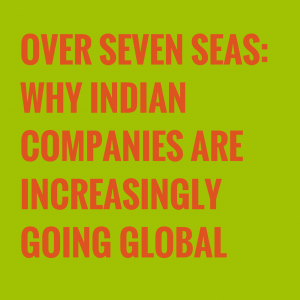 While there are no numbers or research on how many Indian startups have global operations, I suspect it will be a sizeable number – a number that is growing every month and every year. No longer are Indian startups content in serving merely the domestic market, this new breed of startups and entrepreneurs consider the world as their market.
While there are no numbers or research on how many Indian startups have global operations, I suspect it will be a sizeable number – a number that is growing every month and every year. No longer are Indian startups content in serving merely the domestic market, this new breed of startups and entrepreneurs consider the world as their market.
This, however, is not something that has happened overnight. We see a considerable number of Indian companies like Zoho, InMobi, Zomato going global and one consistent theme is that the entrepreneurs have some sort of a global stint. A recent report said that in China, 5 out of 10 billionaires are Internet billionaires and the common thread is that they have all studied or had stints in the US.
I feel a lot of us in India have the global context, having studied or worked or having both those experiences. Global context enables us to understand what market opportunities exist and the emerging trends throughout the world. To build a global company you need to have a global perspective and you need people at the top who think that way.
The second big pointer is the evolution of the Indian IT industry. When we started the revolution of IT services in 1990s with companies like HCL, Wipro and Infosys, it was all about labour arbitrage and how to get things done in a cheaper, better and more efficient way in India. Now that story has been beaten to death and people are more aware of what services companies are doing in the context of the opportunities that exist globally. Hence, instead of being a mere back end provider, people want to move up the value chain. People understand the opportunities and are now questioning why they can’t go out and address it.
Business today is borderless and in a global economy, boundaries have blurred and opportunities can be tapped across the globe. The intermingling of cultures and people on a very large scale has meant that whenever anyone thinks of any opportunity it is very easy to think about it as a global opportunity. Previously the thought process was limited to the market size of the domestic market.
For example, when we talk about selling to the travel and hospitality industry, we think about how many hotels exist globally and how many airlines operate across the world. The globalized nature of what we do today makes it much easier to implement ideas. There may still be some friction in the system, but today it is relatively easy to have the world as your playground.
It is also the question of market size. Although the 1.2 billion dollar home market may be a very big market, operating globally gives you a much bigger market size. Take for example the fact that 300 million tourist travel domestically, but the travel and hospitality market in India is fragmented. As a result the organized hospitality industry has about 120,000 rooms. New York alone has 120,000 rooms.
For us as a B2B player, we have to go where the marketplace is more mature. India today is as small as New York for us. Globally, we have 500,000 hotels and 500 airlines cater to. Even product companies that started with a notion of serving the domestic market have now gone global. It is also the case that if you are successful overseas, the domestic market tends to you accept you faster. Druva, Zoho are very good examples of that.
The ticket size for everything is much more globally. If a company sells something for a minimum ticket size of 10,000 dollars globally in India one has to sell it for 5000 $. The cost of operation for most of these companies, whether they sell domestically or globally, remains the same and any marginal increase is the cost of sale. Just by selling overseas, even for a small incremental change in cost, the company enjoys a much larger margin. It makes much more economic sense to go overseas, which means the opportunity size is much larger.
By going global Indian companies are writing a new chapter in how the world perceives us. Many of them are the future billion dollar companies and will serve to be great ambassadors of the are “Made in India” campaign that our Prime Minister has embraced.. With every globally successful company, India is creating role models for others to emulate.

